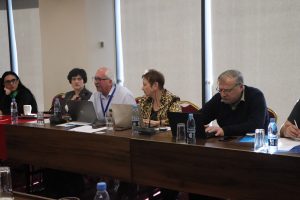The water security of a nation or region faces an array of threats, encompassing biohazards, climate change, natural disasters, political violence, and more. Nonetheless, water scarcity stands out as the most prevalent peril to water security. The ever-increasing global population amplifies the demand for safe drinking water and irrigation resources to sustain food production, thereby exacerbating water crises where there’s insufficient water to meet everyone’s needs at adequate levels.
While Armenia boasts a relative abundance of water resources and is classified as a “moderately secured” country with freshwater assets, equitable access to drinking water and sanitation remains an issue for numerous rural communities within Armenia. It’s worth noting that since January 1, 2017, water supply and sanitation (wastewater treatment) services have been managed by “Veolia Djur” CJSC. Approximately 579 out of 1,002 rural settlements lack centralized water supply and sanitation services, falling outside the coverage of water supply companies. The provision of water supply in these settlements is overseen by the local village administrations.
The matter of ensuring equitable access to drinking water and sanitation services was a central topic of discussion during a meeting titled “Implementation of the UNECE/WHO Protocol on Water and Health in Armenia, Georgia, and Moldova.” This event took place on October 25, 2023, at the Mozart Hall of Yerevan’s Opera Suite Hotel. The meeting was organized by the “Armenian Women for Health and Healthy Environment” (AWHHE) NGO, as part of the EaP CSF-funded project “Facilitating exchanges of experiences and best practices between Armenia, Georgia and the Republic of Moldova on equitable access to safe drinking water in frame of UNECE/WHO Protocol on Water and Health”. The project is a collaborative effort involving the AWHHE NGO, the environmental organizations “Dniester River Keepers – Eco-TIRAS” from Moldova, and the International Center for Environmental Research (IFCER) from Georgia.
The meeting brought together participants representing Armenian state and local self-government bodies, the United Nations Economic Commission for Europe, civil society organizations (CSOs), the media, and delegates from Moldova and Georgia, representing the aforementioned organizations. The event commenced with welcoming addresses by Elena Manvelyan, President of the AWHHE NGO, and Hovsep Khurshudyan, EaP CSF Armenian National Platform Coordinator, who conveyed their hopes for a productive exchange.
Throughout the meeting, in-depth discussions focused on sharing experiences and best practices related to the implementation of the UNECE/WHO Protocol on Water and Health in Armenia, Moldova, and Georgia. Discussions also extended to the challenges obstructing the enhancement of drinking water supply and sanitation in underserved communities.
According to Ilya Trombitsky from Eco-TIRAS, a priority problem identified is the high level of non-conformity of drinking water quality from underground sources and rural aqueducts, which presents risks for the health. He also mentioned that the slow progress and the large discrepancy between urban and rural populations regarding access to safely managed water supply and sanitation systems are considered the most significant problems. The implementation of the National Programme regarding the implementation of the Protocol on Water and Health in the Republic of Moldova (2016-2025) constitutes a national priority with an effect on increasing the level of quality of life and implicitly the state of health of the population.
In his speech, Gia Abramia from the International Center for Environmental Research noted that in Borjomi Municipality settlements Akhaldaba, Kvibisi, and Zanavi people rely on wells as their alternative source of drinking water. Unfortunately, some of the wells are not located in proper places and the sanitary-hygienic requirements are not always applied. During their research, they identified that from 18 wells only 4 well owners provided chlorine treatment of their objects. He suggested that Intesti Bacteriophage legally recognized medical preparation should be used for prophylactic reasons during the spread of intestinal illnesses by adding the preparation into the wells.
At the end of the meeting, participants offered solutions and recommendations to address the issues of equitable access to drinking water supply and sanitation.
“The project benefits from the support through the EaP CSF Re-granting Scheme. The aim of the project is to strengthen the regional dimension and cooperation by collecting and disseminating information and sharing experiences in ensuring equitable access to water supply and sanitation in Armenia, Georgia, and the Republic of Moldova in the frame of the UNECE/WHO Protocol on Water and Health to the 1992 Convention on the Protection and Use of Transboundary Watercourses and International Lakes”.
Contact person: Emma Anakhasyan
Organization: Armenian Women for Health
and Healthy Environment NGO
Telephone number: +374 10523604
E-mail address: officeawhhe@gmail.com
Website address: www.awhhe.am

